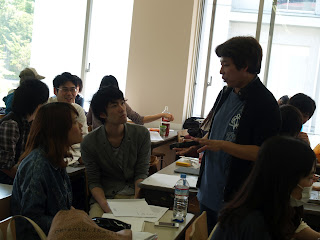After Prof. Iba lectured on structural
coupling in Social Systems by Nilkas
Luhmann, he shifted the topic to “Voice and Exit.” Its concept was proposed by
Albert O. Hirschman, an influential economist, in Exit, Voice, and Loyalty in 1970.
Voice and Exit are two options to change a
complained situation. Hirschman explains, “Management then finds out about its
failings via two alternative route.”
Prof. Iba continued teaching the detailed
concepts with familiar examples.
Exit is an option to leave without saying
anything; therefore, people need to think about reasons why the person left.
For instance, a member in the lab left without say any reason or complain, it
means that he or she takes exit option.
Hirschman uses another example to encourage
us to understand it.
“Some customers stop buying the firm’s
products or some members: this is the exit option. As a result, revenues drop,
membership declines, and management is impelled to search for ways means to correct
whatever faults have led to exit.”
On the other hand, Voice is the other
option to express their dissatisfaction directly. Prof. Iba used the example
that a member in the lab says his or her concerns or motivation, and leaves. In
this case, he or she chooses voice option.
Compared to Exit, Voice likely leads direct
and immediate solutions. Moreover, he emphasized that voice has more clear
intentions or objectives to change the situation.
In the meantime, he also expressed that we
need to understand both of voice and exit in the interdisciplinary fields even
thought most cases are dominant over one of them.
As usual, students had an opportunity to
deepen their understands on contents through dialogues with other students. In
the class, they discussed what the concepts of Voice and Exit are with their
familiar topics.
Prof. Iba kept introducing another idea,
Loyalty, with quotes from Hirschman.
“As a rule, then, loyalty holds exit at bay
and activates voice.”
“As a rule of loyalty, these potentially
most influential customers and members will stay longer than they would
ordinarily, reasoned expectation that improvement or reform can be achieved
“from within.” ”
Students’ faces looked puzzled because they
have no idea how those ideas are related to Social Systems Theory.
At the end, Hirschman emphasized that those
“actions” leads to change organizations and the society. However, Prof. Iba
believes that “communication” is the key to change society, therefore, he
brought the point that we redefine Hirschman’s theory as “communication”
theory. For instance, we can ask ourselves how it is possible to cause the
chain of Voice communication, even though Voice communication is hardly
generated consecutively.
References
- Albert O. Hirschman, Exit, Voice, and Loyalty: Responses to Decline in Firms, Organizations,
and States, Harvard University Press, 1970





No comments:
Post a Comment